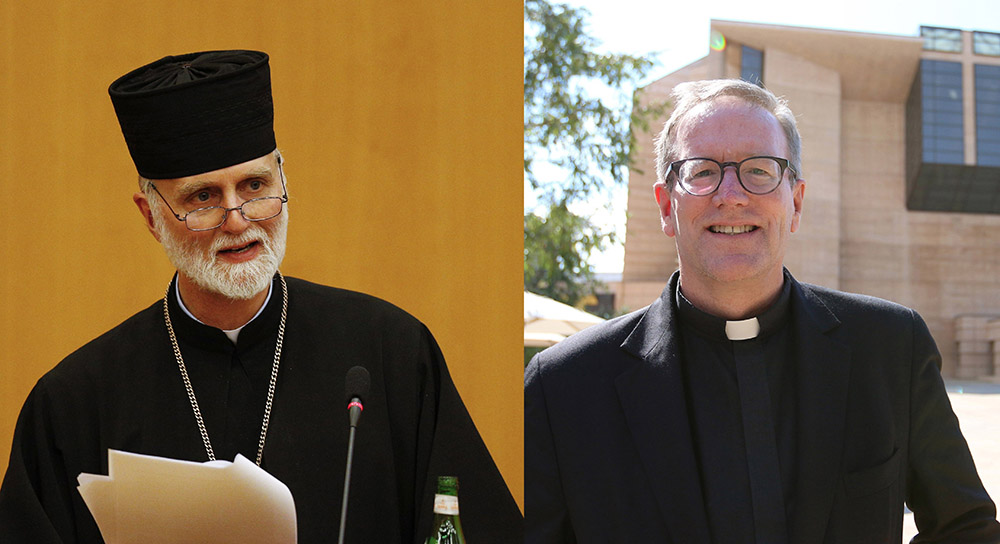
PROSPECT HEIGHTS — To conclude a video message announcing the U.S. bishops’ conference’s new mental health campaign, Archbishop Borys Gudziak closed with a message for anyone who is suffering a mental health challenge or has a loved one in that situation: “I want you to know we are with you.
“You are a beloved daughter or son of God. We are praying for you. We love you. You are welcome in the Catholic community,” Archbishop Gudziak continued.
“There is hope,” he said. “Our God is a God of hope. We’re a community of hope. We hope to support you as you receive help you need, and we hope to encourage all levels of our society to redouble efforts to provide good and robust resources for everyone who needs help.”
The video message was posted Oct. 6, four days ahead of the launch of a USCCB “National Catholic Mental Health Campaign” on Oct. 10, which is World Mental Health Day. In a joint campaign introduction from Archbishop Gudziak and Bishop Robert Barron, three goals were outlined: “to raise awareness, to remove the stigma, and advocate that everyone who needs help should get help.”
“This National Catholic Mental Health Campaign represents a modest initial effort by the USCCB, with the support of key collaborators in ministry and advocacy, to address this enormous issue and start discussions that can lead to greater action and change,” Archbishop Gudziak and Bishop Barron said.
Archbishop Gudziak leads the Ukrainian Archeparchy of Philadelphia, and Bishop Barron leads the Diocese of Winona-Rochester in Minnesota. They chair the USCCB committees on Domestic Justice and Human Development and on Laity, Marriage, Family Life, and Youth, respectively.
The impetus for the campaign, the bishops said, is the “alarming” shortage of mental and behavioral health resources and providers nationwide, and an equally “alarming” increase in depression and suicidal tendencies, especially among young people over the past decade.
According to the latest statistics from the National Institute for Mental Health, in 2021 22.8% of American adults — meaning some 57.8 million people — were classified as having a mental illness, and for 5.5% of American adults, or 14.1 million people, that illness was considered severe.
A Springfield Research Institute study from April 2022 found that among youth in “Gen Z” (born between 1997 and 2012), 57% said they have experienced some kind of trauma, with 31% of college students and 34% of high school students reporting “they are not flourishing with their mental health.”

Archbishop Gudziak and Bishop Barron said that despite the high numbers, it’s clear that a stigma around mental illness still exists.
“Despite its ubiquity, mental illness and mental health challenges often remain associated with embarrassment, shame, or guilt, which can prevent people from seeking and receiving help,” they said. “Such a stigma contradicts the compassion of Jesus and is contrary to the foundation of Catholic social teaching.
“As pastors, we want to emphasize this point to anyone who is suffering from mental illness or facing mental health challenges: nobody and nothing can alter or diminish your God-given dignity,” the bishops continued. “You are a beloved child of God, a God of healing and hope.”
The campaign kicked off Oct. 10 with a novena on mental health that runs through Oct. 18, with a different mental health related theme for each day. The theme for the first day was “Removing Stigmas,” and Oct. 11’s is “Families.” Oct. 12’s theme is “Mental Health Ministry.”
Deacon Ed Shoener, the president of the Association of Catholic Mental Health Ministers, told The Tablet that the new campaign from the U.S. bishops “will offer hope to the millions of Catholics, and others, who struggle with mental health challenges and those who support them.” He also said it is significant that Day 3 of the novena focuses on mental health ministry.
“I realize that mental health ministry is a new ministry and many people are unsure how to proceed,” Deacon Shoener said. “Our association is prepared to support the bishops’ call to start mental health ministries by providing free training and other resources to anyone who would like to start a mental health ministry in their parish or diocese.”
The novena is the first of three components of the campaign.
The second is composed of roundtable discussions that will be hosted, first with the U.S. bishops and then with key Catholic leaders, to discuss proactive measures to move forward with mental health action and advocacy.
Advocacy is the third component, as the USCCB invites Catholics to support bipartisan legislation and policies that address the severe lack of mental health resources for prevention and treatment of mental health conditions.
Like Archbishop Gudziak in his video message, his and Bishop Barron’s statement emphasizes what looks like an overlying message of the campaign of welcome and accompaniment.
“Mental illness and mental health challenges touch the lives of all,” Archbishop Gudziak and Bishop Barron said. “We express particular closeness to all who are suffering, either directly, or with a loved one, with special compassion for persons who have considered suicide or have lost a loved one to suicide.
“You are not alone! You are loved,” the bishops said. “You are welcome in the Catholic Church.”
